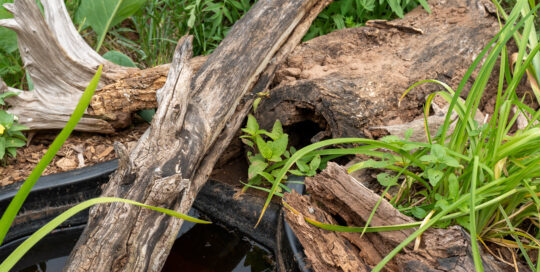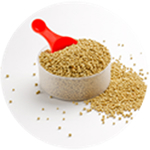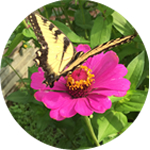Wasps in the garden: most are beneficial and benevolent
Views: 863
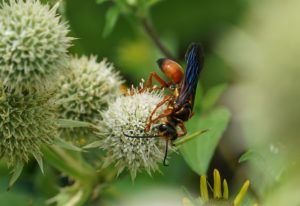
This weekend, I encountered several different wasps while working in my yard. I’m not afraid of most wasps, but I’m not deathly allergic to their stings, either. Even if you are, it might not be necessary to run for the bug killer. Most wasps in the garden are non-aggressive; only a few are likely to sting. Here’s the scoop on which are which.
Solitary wasps
There are thousands of species of wasp in the Unites States. Worldwide, they may be the most diverse group of insects. Most wasps are solitary; they don’t live in hives or nests. Often, they live in burrows in the ground. These wasps are typically predators, catching insects or spiders to bring back to their burrow to feed their young.
Solitary wasps aren’t aggressive. They don’t sting. In fact, they typically ignore people entirely. When I photograph insects, I get quite close to them. I’ve never been stung by a solitary wasp, and I probably never will be. They won’t bother you, either.
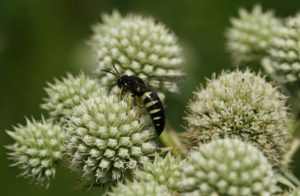
This is probably Bicrytes quadrifasciatus, a four-banded stink bug wasp.
Parasitic wasps
Parasitic wasps are solitary wasps that paralyze another insect or spider (for example, a grasshopper) and then lay their eggs on or in the insect’s or spider’s body. The host’s body provides food and shelter for the wasp larvae. It’s pretty gruesome to think about, but wasps do help maintain balance by keeping the number of harmful insect pests down. In fact, historically, some species have been used as biological pest control for agriculture. If you have an insect problem in your garden, there’s a good chance that having the right wasps around will help keep your problem in check.
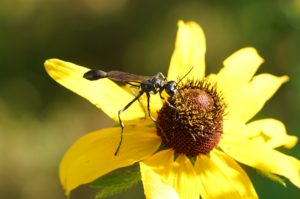
Eremnophila aureonotata, also known as the gold-marked thread-waisted wasp. This wasp captures and paralyzes caterpillars, grasshoppers, and crickets for its young.
Social wasps
Social wasps give all wasps a bad reputation. In fact, three of the most aggressive wasps are social: yellow jackets, hornets, and paper wasps. These wasps live in colonies such as nests or hives, and they tend to be territorial and protective of their homes. In my personal experience, only red paper wasps have ever stung me “out of the blue,” just for being in the general vicinity of their nests, but I know yellow jackets and hornets will often sting, too.
Still, if you’re cautious around social wasps, it’s possible to coexist, especially if their nest or hive is not in an easily or frequently disturbed area. We ran into problems when they decided to nest in the overhang above our front door….
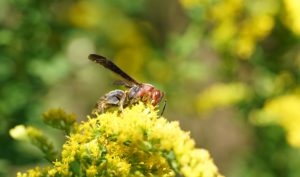
Red paper wasps like this one can be aggressive when defending their nests.
Wasps are pollinators, too
Many adult wasps rely on nectar as an important food source, and it’s good to remember that wasps are pollinators, too. While they may not be as effective at transferring pollen from flower to flower as a fur-covered bumblebee, wasps are important pollinators. Some plants rely heavily on wasp pollination. For example, several species of orchid are pollinated only by wasps.

The hairy body of this double-banded scoliid wasp makes it an effective pollinator.
Try to live in harmony
The majority of wasps in the garden are more beneficial than not. They provide biological pest control, and they are generalist pollinators. Keep an eye on social wasps; if they start to build in your territory, action may need to be taken. But don’t be afraid of solitary wasps. They mind their own business and are fascinating, helpful visitors to your gardens.
Meet Leslie Miller
Leslie Ann Miller shares 3.5 acres in rural Oklahoma with birds, butterflies and wide variety of animals. She is currently transforming her yard with plantings…
Leslie's Recent Posts
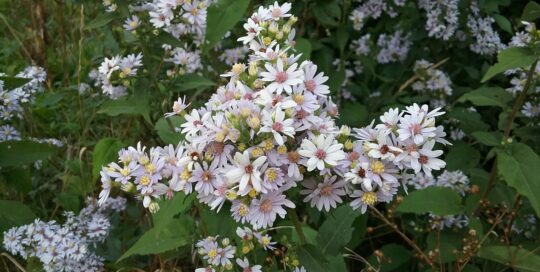
Drummond’s Aster: a native beauty that benefits bees
